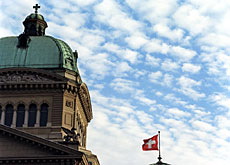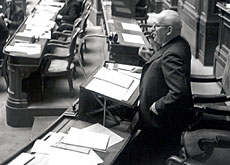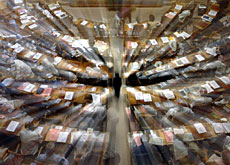Rightwing wins Swiss parliamentary elections

Final results in Switzerland’s parliamentary elections show the rightwing Swiss People’s Party has won the largest share of the vote.
The party called it a “historic victory” and demanded an additional cabinet seat, putting forward a leading party figure, Christoph Blocher, as its candidate.
According to final results released on Monday, the People’s Party gained an additional 11 seats in the 200-member House of Representatives, taking its total to 55.
The party’s share of the popular vote increased to 26.6 per cent, up four per cent from 1999.
The People’s Party campaigned strongly in favour of less taxes, tougher asylum rules and against closer ties with the European Union.
“We need a second [cabinet] seat and our candidate would be Blocher,” Ueli Maurer, the president of the People’s Party, told Swiss television.
“This is a serious battle. Last time around we all knew that there was no chance, but this time I think there’s a 50 per cent chance [of getting a second seat],” Blocher told swissinfo.
Such a move would change the so-called “Magic Formula”, a power-sharing arrangement dating back to 1959 that gives the Social Democrats, the Radicals and the Christian Democrats two seats each, and one for the People’s Party.
“If Blocher is not elected we will withdraw our current [cabinet] minister, Samuel Schmid, and go completely in the opposition,” added Maurer. The cabinet elections are due to take place on December 10.
The People’s Party for the first time made big gains in French-speaking Switzerland, even winning two seats in the Centre-left stronghold of Geneva.
Turnout was estimated at 44.5 per cent, up from 43.3 per cent in the 1999 elections.
Disappointment
Sunday’s vote was a big disappointment for the Centre-right: the Radicals and Christian Democrats each lost seven seats. The Radicals now hold 36 seats in the House of Representatives, with just 28 seats for the Christian Democrats.
Philipp Stähelin, president of the Christian Democrats, admitted that his party had been badly defeated and offered to resign.
“I’m not attached to my presidency,” Stähelin told Swiss radio. On Monday, he said he had decided to remain in his post, after the party leadership gave him their backing.
The centre-left Social Democrats held their ground with 52 seats, up from 51.
“I am happy with our results, but it worries me that the Swiss People’s Party has gained so many seats,” said the party’s president, Christiane Brunner.
Switzerland’s Green Party turned out to be one of the winners of this year’s elections, gaining four seats.
“People are a lot more sensitive to environmental problems than they were four years ago,” Martin Bäumle, president of the Green Party in Zurich, told swissinfo.
“I think this year’s result is very important, because if the Green Party can form a strong faction, then other parties will have to think more about the environment.”
Senate votes
About 4.7 million Swiss were eligible to vote. They also cast their ballot in Senate elections in 22 of the 26 cantons.
Final results in the Senate elections show the centre-left Social Democrats winning at least one additional seat.
In a major upset in canton Bern, Simonetta Sommaruga won a seat for the Social Democrats at the expense of the Radicals. Sommaruga, who has been a member of the House of Representatives, is a well-known advocate of consumer protection.
Run-off elections will have to take place in six cantons next month, because candidates did not receive an absolute majority.
The centre-right Christian Democrats and the Radicals remain the biggest parties in the Senate.
swissinfo
The People’s Party’s share of the vote has risen by more than five per cent since the 1999 election.
In eight years, the party has gone from being the smallest of the four in government to the largest.
Around 4.7 million people were eligible to vote in Switzerland.
Turnout was 44.5 per cent, up from 43.3 per cent in the 1999 elections.
Parliamentarians in the House of Representatives are elected by proportional representation.
The Senate is largely chosen by the first-past-the-post system.
The number of parliamentarians each canton sends to the 200-member House of Representatives depends on the size of the canton’s population.
This is not the case with Senate, where each canton sends two senators and each half canton sends one. There are 46 senators in total.

In compliance with the JTI standards
More: SWI swissinfo.ch certified by the Journalism Trust Initiative










You can find an overview of ongoing debates with our journalists here . Please join us!
If you want to start a conversation about a topic raised in this article or want to report factual errors, email us at english@swissinfo.ch.